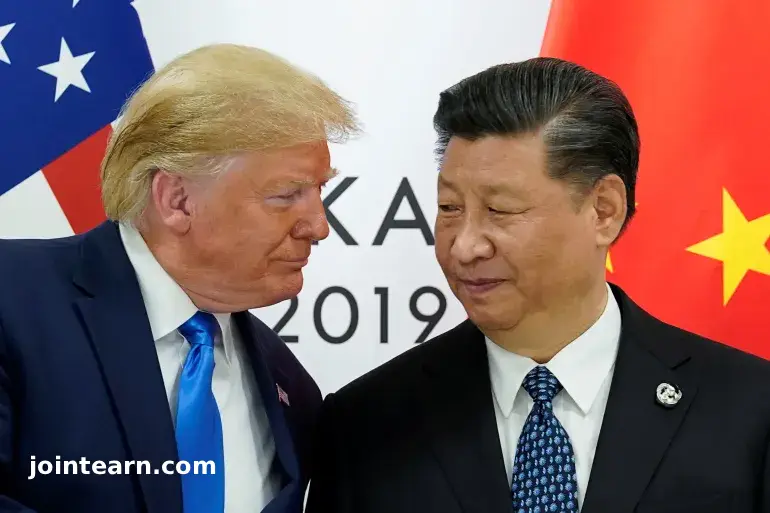
The United States government has launched a formal investigation into whether China has violated the terms of their 2020 “Phase One” trade agreement, reigniting tensions between the world’s two largest economies.
The move, announced by US Trade Representative Jamieson Greer on Friday, comes as President Donald Trump travels through Asia for high-level meetings, including a long-anticipated face-to-face with Chinese President Xi Jinping.
Beijing quickly rejected Washington’s claims, insisting it has “scrupulously fulfilled its obligations” under the trade accord.
Background: Renewed Pressure in the US-China Trade War
The investigation marks the latest escalation in the US-China trade war, which has defined much of Trump’s presidency. The 2020 Phase One Agreement, signed during Trump’s first term, was designed to restore balance in trade between the two countries after years of economic friction.
Under that deal, China agreed to increase imports of US agricultural and manufactured goods, including soybeans, energy products, and aircraft, while pledging stronger protections for intellectual property and limits on forced technology transfers.
However, US officials now allege that China has failed to uphold several of these commitments, particularly those involving purchases of American goods and reforms in financial services.
What the Investigation Entails
The new federal probe, published in a Federal Register notice by the Office of the US Trade Representative (USTR), claims China has not lived up to promises related to:
- Agricultural purchases, especially soybeans and corn
- Intellectual property and patent protections
- Technology transfer practices
- Market access for US financial firms
In September 2025, China reportedly imported no soybeans from US farmers — the first time this has occurred since 2018.
Trade Representative Greer emphasized that the investigation demonstrates Washington’s determination to ensure accountability:
“The initiation of this investigation underscores the Trump administration’s resolve to hold China to its Phase One commitments, protect American farmers, ranchers, workers, and innovators, and establish a more reciprocal trade relationship with China.”
Beijing Responds: “China Has Met Its Obligations”
A spokesperson for the Chinese embassy in Washington dismissed the accusations, saying the country had “scrupulously fulfilled its obligations” under the Phase One agreement.
“China has acted in good faith and implemented every part of the deal as agreed,” the statement read on social media platform Weibo, describing the US investigation as politically motivated.
The Chinese Ministry of Commerce (MOFCOM) warned that retaliatory measures could follow if new tariffs or restrictions are imposed by Washington.
Trump’s Strategic Timing Ahead of Asia Tour
The announcement coincides with President Trump’s Asia tour, which includes stops in South Korea, Japan, and China, as well as bilateral talks with key regional leaders. Trump is expected to meet Xi Jinping this weekend to discuss trade, rare earth exports, and regional security issues.
Analysts suggest the timing of the probe may be deliberate, giving Trump additional leverage in negotiations with Beijing.
According to Wendy Cutler, former US trade negotiator and vice president of the Asia Society Policy Institute, the move “adds another pressure point to get China to buy more US soybeans and other goods.”
She added that the administration “appears to be looking for new sources of leverage to use against Beijing amid a shifting trade landscape.”
Implications for Farmers and Global Markets
The investigation and potential new tariffs on China could have major ripple effects for global markets. American farmers, still recovering from earlier tariff disputes, remain heavily reliant on Chinese demand for soybeans and other crops.
Experts warn that further trade friction could trigger supply chain disruptions, depress commodity prices, and complicate agricultural exports across Asia.
China, meanwhile, continues to strengthen economic ties with Southeast Asian nations, positioning the ASEAN region as a growing trade partner amid ongoing tensions with the US.
Rare Earth Metals and Technology Exports at the Center
The upcoming US-China trade talks, scheduled for Saturday, will also focus on China’s export restrictions on rare earth elements — minerals crucial for producing electric vehicles, smartphones, and defense equipment.
Washington views these restrictions as a direct threat to the US technology sector, particularly companies dependent on advanced materials sourced from China.
Analysts believe the rare earth dispute could become the next flashpoint in an increasingly complex US-China economic rivalry.
Economic and Political Repercussions
The new probe underscores the Trump administration’s continued commitment to using tariffs and trade enforcement as tools of diplomacy. Since returning to office, Trump has repeatedly pledged to “end unfair trade practices” and reduce America’s trade deficit with China.
However, economists warn that aggressive measures could backfire by increasing consumer prices and destabilizing financial markets already under strain from global uncertainty.
“Trump’s trade policy is driven by confrontation rather than collaboration,” said an economist at the Brookings Institution. “While it may deliver short-term political wins, it risks long-term economic damage.”
What Happens Next
The investigation could take several months to complete. If it finds that China violated the Phase One deal, the White House could impose new tariffs, sanctions, or other trade restrictions without congressional approval.
Both nations are expected to continue dialogue during Trump’s Asia visit, though few expect a breakthrough given the hardened positions on both sides.
Still, some analysts note that Beijing may seek limited concessions — such as additional agricultural imports — to defuse tensions and avoid another full-scale US-China trade war.
Conclusion: A Renewed Chapter in US-China Trade Tensions
The launch of the investigation signals a new phase in the US-China trade conflict, five years after the signing of the 2020 agreement that was meant to stabilize relations.
As President Trump and President Xi prepare to meet in Asia, the world is watching closely for signs of compromise — or further escalation — in a trade rivalry that continues to shape global markets, technology, and geopolitics.


Leave a Reply